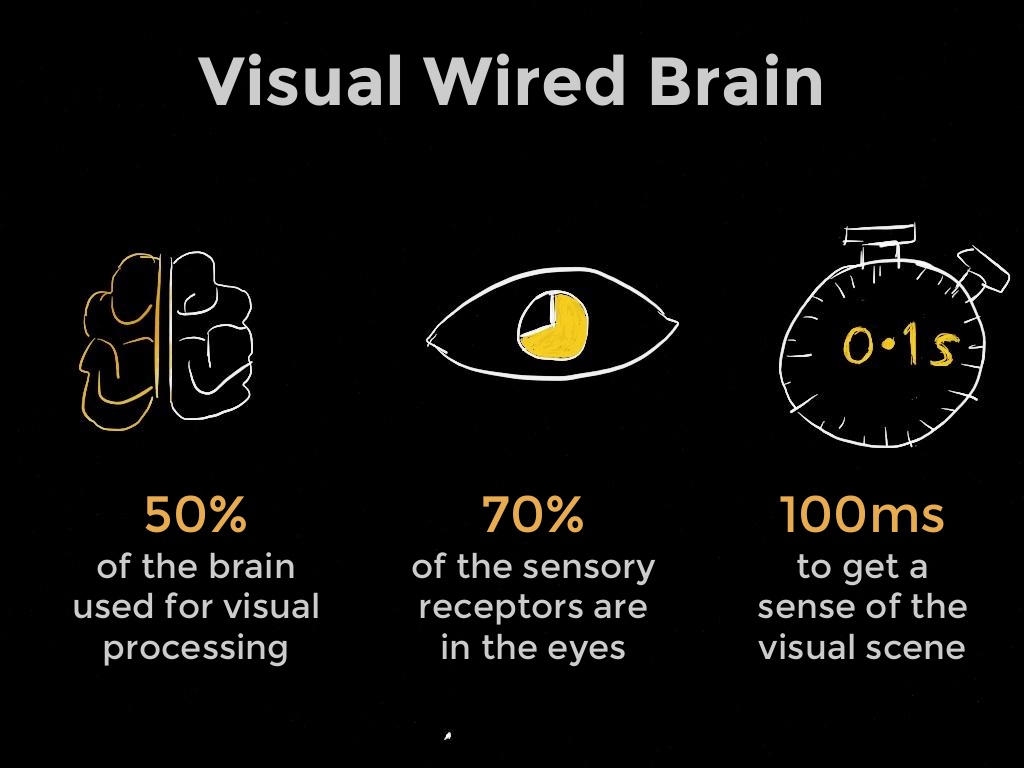In today’s economy, we’re constantly bombarded with new information. Changes happen quickly and our propensity for success often depends upon our ability to assimilate new ideas.
Since Peter Drucker’s “knowledge worker” framework is how most businesses operate in today’s economy (including the real estate industry), our ability to learn quickly and efficiently is critical to our success.
How can you increase your ability to learn? We’ll lean upon some recent brain research to get us pointed in the right direction.
Belle Beth Cooper, a regular contributor to the popular CREW blog recently summarized data from various researchers on how the brain learns information. Here are several of her insights I found most helpful.
We take in information better when it’s visual.
The brain uses 50% of its resources on vision.
Think about that for a minute. Half of your brain power goes to your eyes and the processes in your brain that turn what you see into information. The other half has to be split up among all the other functions your body has.
Vision is not only a power-hungry sense, but it trumps our other senses when it comes to taking in information.
A perfect example of this is an experiment where 54 wine aficionados were asked to taste wine samples. The experimenters dropped odorless, tasteless red dye into white wines to see whether the wine tasters would still know they were white based on the taste and smell. They didn’t.
Vision is such a big part of how we interpret the world that it can overwhelm our other senses.
More than just static visuals, we pay special attention to anything we see that’s moving. So pictures and animations are your best friends when it comes to learning.
We remember the big picture better than the details.
When you’re learning lots of new concepts, it’s easy to get lost in the barrage of information. One way to avoid being overwhelmed is to keep referring back to the big picture. This is probably where you’ll start with something new, so coming back to explore how the new concept you just learned fits into that big picture can be helpful.
In fact, our brains tend to hang onto the gist of what we’re learning better than the details, so we might as well play into our brains’ natural tendencies.
When the brain takes in new information, it hangs onto it better if it already has some information to relate it to. This is where starting with the gist of an idea can be helpful: it gives you something to hang each detail on as you learn it….
[To apply this concept], keep a large diagram or page of notes handy that explains the big picture of what you’re learning and add to it each major concept you learn along the way.
We learn best by teaching others
When we expect to have to teach other people what we’re learning, we take in new information better. We organize it better in our minds, remember it more correctly, and we’re better at remembering the most important parts of what we’ve learned.
One study told half the participants they would be tested on the information they were learning, and told the other half they would have to teach someone else what they learned. Both sets of participants were tested on the information and didn’t have to teach anyone else, but the subjects who thought they’d be teaching others performed better on the test.
The study’s lead author, Dr. John Nestojko, said the study implied that students’ mindsets before and during learning can make a big difference to how well we learn new information. “Positively altering a student’s mindset can be effectively achieved through rather simple instructions,” he said.
Though we don’t realize it, learning with the idea that we’ll have to teach this information later tends to invoke better methods for learning subconsciously.
All three of these techniques can be applied without too much effort. Start using them now as you’re taking in new information.
Also, teach your agents to use these techniques too. The more effective we are at learning, the more you’ll realize in any venture.
Questions or Comments? Reply to your WorkPuzzle subscription email.
Didn’t get the WorkPuzzle email? Subscribe below. We promise not to share your email with others or use it for any other purpose but delivering WorkPuzzle notices.



